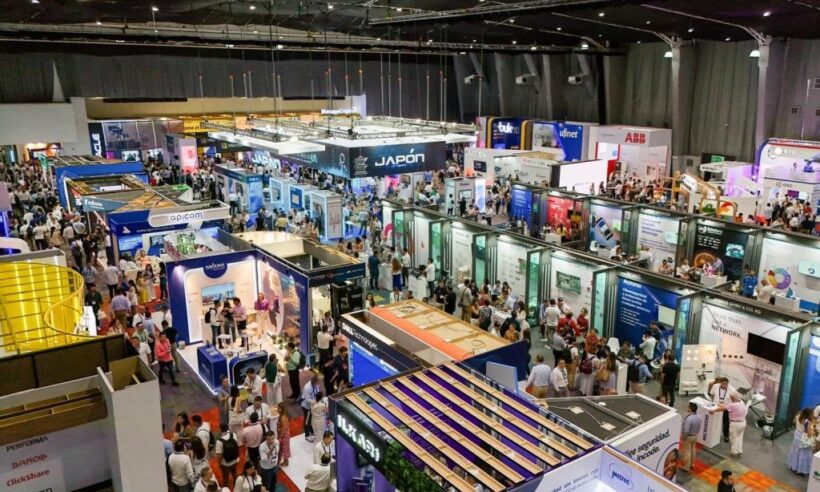Colombia’s Largest IT Event: ANDICOM 2024 Saw 6000 Participants From 35 Countries
ANDICOM 2024, organized by CINTEL, concluded its 39th edition, with artificial intelligence (AI) and connectivity as key focal points. Held in Cartagena, Colombia, from September 4 to 6, the event brought together 6,000 participants from more than 35 countries, including 2,000 business delegates and over 150 international speakers across 110 academic sessions.
Japan, the event’s guest of honor, showcased its technological innovations and contributed speakers who presented the country’s vision in areas such as AI and cybersecurity. A Memorandum of Cooperation was signed between the governments of Japan and Colombia, focusing on enhancing collaboration in cybersecurity, AI, infrastructure development, and promoting connectivity in rural areas.
The event included a pre-conference featuring sessions on AI, smart cities, and blockchain, attended by 450 participants. The primary agenda covered a wide range of topics, including AI, robotics, 5G, cybersecurity, and digital transformation. Colombia’s Ministry of Information and Communications Technology (MinTIC) outlined its progress in advancing the country’s digital capabilities. MinTIC launched the National Observatory of Information and Communications Technologies (Ontic), a platform designed to consolidate key connectivity data for Colombia.
Additionally, Gabriel Jurado, Colombia’s Vice Minister of Connectivity, introduced six key initiatives aimed at expanding internet access nationwide. These included strengthening mobile and fixed access networks, increasing connectivity for educational institutions, improving affordability, and enhancing institutional capacity.
The event also addressed gender inequality in the technology sector, with representatives from various organizations signing a manifesto to promote women’s participation in science, technology, engineering, and mathematics (STEM).
Telecommunications Sector Challenges
A key focus of ANDICOM 2024 was the challenges facing the telecommunications sector. In a panel discussion on future connectivity, industry leaders emphasized the need for robust infrastructure to support AI and smart city initiatives in Colombia. While efforts to close the connectivity gap are underway, panelists called for regulatory attention to issues such as network traffic management, energy costs, and the “fair share” debate, which centers on whether content providers like Netflix and Google should contribute to network infrastructure costs.
The panel on “Innovation and Equity: Exploring Fair Share in Telecom” sparked diverse opinions, with discussions covering governance, spectrum management, and consumer impacts. Panelists largely agreed on the importance of maintaining net neutrality, which they argued could be at risk from potential regulatory intervention.
AI: Present and Future
Artificial intelligence was a recurring theme at ANDICOM 2024. Oracle announced the deployment of Nvidia’s latest generation GPUs in Colombia, which will be used to expand AI capabilities for businesses and government organizations. Marcelo Christianini, Oracle’s VP of AI and Cloud Engineering for Latin America, highlighted the company’s investment in AI infrastructure as a key step toward enabling large-scale AI adoption.
Speakers at the event included Gabriele Mazzini, principal architect of the European Union’s AI Act, who discussed the importance of local considerations in AI regulation. Hiroshi Ishiguro, executive director at AVITA and professor at Osaka University, presented on the use of AI to create avatars aimed at enhancing human physical and cognitive abilities. Ishiguro’s research focuses on using AI to improve quality of life by providing better access to healthcare and education.
AI’s potential in the financial sector was also discussed. Panelists in the session on “Economic Transformation through AI” noted that AI can streamline verification processes and improve decision-making. However, challenges such as technology investment, data sovereignty, and skills development remain barriers to wider AI adoption.
Innovation and Technology for Social Transformation
Innovation and technology were central to ANDICOM’s discussions. Diana Barrero Zalles, head of research and sustainability at the Global Blockchain Business Council, emphasized the role of blockchain in driving innovation and sustainability in the region. She stressed the need for harmonized regulations, particularly regarding tokenization and digital assets, to facilitate global exchanges.
The conference also addressed Colombia’s energy transition with a panel on sustainable energy. Participants from various sectors discussed the barriers and opportunities in transitioning to clean energy, with a focus on user adoption and the environmental impact of new energy technologies.
Andra Keay, director of Silicon Valley Robotics, concluded the event with a presentation on the role of robots in society. Keay argued that while robots are increasingly capable of performing repetitive tasks, ethical considerations must guide the development and implementation of AI and robotics technologies.
Networking and Business Opportunities
In addition to the academic sessions, ANDICOM 2024 provided a platform for business networking. Attendees participated in meetings with technology buyers, including chief technology officers (CTOs) and chief information officers (CIOs), to discuss short- and medium-term investment plans.
CINTEL’s Digital Leaders community hosted workshops on cybersecurity and AI for CIOs from various industries, facilitating discussions on the potential of digital tools in different sectors.
According to CINTEL’s executive director, Manuel Martínez Niño, ANDICOM continues to be a key event for the region’s technology sector. The conference is a space where government, academia, and industry come together to discuss the role of technology in social transformation. Plans for the 40th edition of ANDICOM in 2025 are already underway.
Key Figures from ANDICOM 2024:
- 6,000 participants
- 35 countries represented
- 215 companies in the commercial exhibition
- 2,000 business delegates
- 150 international speakers
- 110 academic sessions
- 250 square meters dedicated to the Japan Pavilion
- 450 pre-conference attendees


























